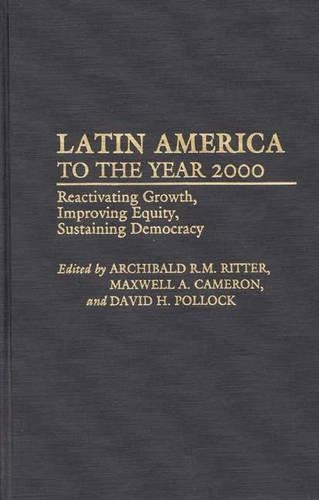
Latin America to the Year 2000: Reactivating Growth, Improving Equity, Sustaining Democracy
(Hardback)
Publishing Details
Latin America to the Year 2000: Reactivating Growth, Improving Equity, Sustaining Democracy
By (Author) Maxwell A. Cameron
By (author) David Pollock
By (author) Archibald Ritter
Bloomsbury Publishing PLC
Praeger Publishers Inc
30th January 1992
United States
Classifications
Tertiary Education
Non Fiction
Development studies
Macroeconomics
330.980039
Physical Properties
Hardback
280
Description
Can the experience of the 1980s in Latin America be analyzed and evaluated to shed light on prospects for the 1990s The central objective of this volume is to survey the development experience of the Latin American region in the 1980s and explore prospects for the coming decade. In this context, themes of crucial importance for the region are examined, including democratic consolidation, income distribution, the environment, hyperinflation and the debt problem. Although socioeconomic and political aspects are emphasized, issues of equity and the environment are of special importance. Case studies of Peru, Chile, Mexico, Argentina and Cuba provide fresh information on these issues in specific countries. Central issues concerning the region's economy are the focus in the first part of the book. In the second part, key issue areas for the future are discussed. Of central concern in an exploration of the prospects for Latin America is the sustainability and improvement of democratization which proceeded in the 1980s. On the whole, the authors are not optimistic. The immense economic difficulties faced by the region - the debt overhang, the large and continuing overflow of financial and real resources, hyperinflation in some countries - will not be easy to manage. Although there are no guarantees that equity income distribution will be improved, among the positive developments foreseen for the 1990s are improved economic management, the addressing of environmental issues, and greater attention to issues of women's rights. This book seeks to serve as a useful guide to a complex region for both students and policymakers.
Reviews
"This collection of 17 essays written primarily by Canadian scholars and Latin Americans residing in Canada is organized into three parts: "Economic Prospects and Central Policy Issues;" "Society, Economy and Ecology: Toward Equity and Sustainability;" and, "The Sustainability of Democratization." Most essays deal with overall issues such as hyperinflation, income distribution and redistribution, trade and industrial policy, and the informal economy. Others look specifically at Brazil (Amazonia), Chile (the redemocratization process), Argentina ("An Underdeveloping Country"), Mexico (economic restructuring), and Cuba (prospects for change). Despite the title, most essays are retrospective reflections of the "lost decade" of the 1980s, with some speculation on the implications of that decade for the following one. Over most essays hangs the cloud of the foreign debt crisis which remains unresolved. Surprisingly, none of the authors deals at any length with how that crisis can be unraveled. The editors' introduction states that the authors "are, on the whole, not optimistic concerning the prospects for Latin America in the 1990's." This applies to both economic and political affairs. They present substantial data to justify their pessimism, with which this reviewer cannot really disagree."-Choice
This collection of 17 essays written primarily by Canadian scholars and Latin Americans residing in Canada is organized into three parts: "Economic Prospects and Central Policy Issues;" "Society, Economy and Ecology: Toward Equity and Sustainability;" and, "The Sustainability of Democratization." Most essays deal with overall issues such as hyperinflation, income distribution and redistribution, trade and industrial policy, and the informal economy. Others look specifically at Brazil (Amazonia), Chile (the redemocratization process), Argentina ("An Underdeveloping Country"), Mexico (economic restructuring), and Cuba (prospects for change). Despite the title, most essays are retrospective reflections of the "lost decade" of the 1980s, with some speculation on the implications of that decade for the following one. Over most essays hangs the cloud of the foreign debt crisis which remains unresolved. Surprisingly, none of the authors deals at any length with how that crisis can be unraveled. The editors' introduction states that the authors "are, on the whole, not optimistic concerning the prospects for Latin America in the 1990's." This applies to both economic and political affairs. They present substantial data to justify their pessimism, with which this reviewer cannot really disagree.-Choice
Author Bio
ARCHIBALD R.M. RITTER is Associate Professor of Economics and International Affairs at Carleton University, Ottawa. He is the author of The Economic Development of Revolutionary Cuba: Strategy and Performance (Praeger, 1974), and co-edited (with David H. Pollock) Latin American Prospects for the 1980s (Praeger, 1983). He contributes frequently to journals and books on issues in Latin American development. MAXWELL A. CAMERON is Assistant Professor in the School of International Affairs at Carleton University, Ottawa. He has published a variety of works, including articles appearing in Comparative Political Studies and the Canadian Journal of Latin American and Caribbean Studies. DAVID H. POLLOCK is an Adjunct Professor in the School of International Affairs at Carleton University, Ottawa. In addition to co-editing volumes with Dr. Ritter, he has had a distinguished public service career--from the Royal Canadian Air Force to UN economic commissions. His recent works include contributions to two books on Canada's international relations.
